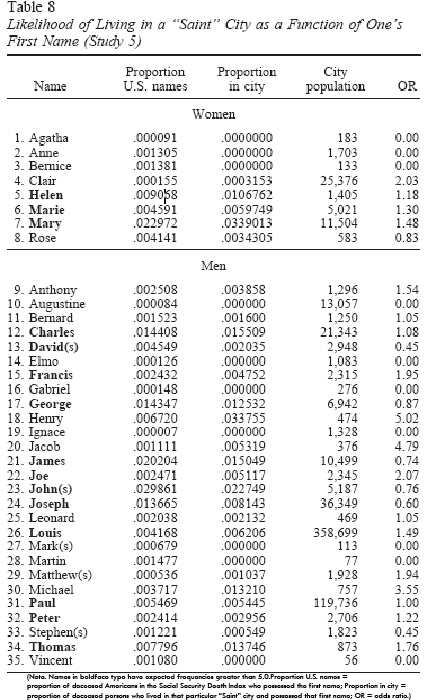Implicit Egotism: What's in a Name?
“What’s in a name? That which we call a rose / By any other name would smell as sweet,” as if saying, ‘I don’t care what his name is, names are arbitrary; like a rose, I love him for who he is, not his name.’
The Bard’s essential point here is certainly romantic, but he obviously wasn’t privy to the psychological insights of the last ten years. If he were, I think Juliet might retract her words altogether.
For names are not just placeholders, not merely semantic conveniences to define Romeo from Juliet. Names have significance and may even be responsible for shaping more life-choices than we would so readily admit. Does your favorite letter appear in your name? If so, read on:
The Name Letter Effect
Social psychologists Brett W. Pelham, Matthew C. Mirenberg, and John T. Jones studied precisely this issue: how do our names affect the type of people we become and the decisions we make? Their findings were published in a 2002 study Why Susie Sells Seashells by the Seashore: Implicit Egotism and Major Life Decisions.
Pelham’s theory was that our names, as words that we intrinsically associate with, might influence significant life choices that we make (such as where to live and what occupation to pursue). He conducted ten different studies to this effect.
There is a similar psychological theory called the name letter effect; a phenomenon that measures implicit self esteem based on nominal associations with the alphabet. In the name letter effect, participants are given a list of letters and told to arbitrarily select their favorites. In almost all cases, cross-culturally and linguistically, participants tend to prefer letters in their first name.
The findings from Pelham’s studies were truly remarkable. Using a conditional probability formula based on percentile population statistics by name, Pelham’s study found that there were significantly more Dennises who were dentists and more Lauras who were lawyers than any statistical projection which factored in the popularity of the name with the probability of either occupation. The same was true for female dentists and male lawyers with names that fit their profession.
What is Implicit Egotism?
The motivation for the project came out of Pelham’s intuitions on implicit egotism; a theory in psychology which asserts that most people associate positively with themselves and therefore tend to prefer things connected to themselves. That’s right, self-love is biologically adapted trait. I don’t think anyone would argue the point that we’re the vainest species on the planet.
Could this just happen to be a coincidence? It appears we’re not just irrational decision makers; our fates begin to start taking shape as soon as Mom and Dad settle upon a name!
In a parallel study, Pelham tested people’s birthdays against their residence, searching for correlations between numbers and places. As their analysis unfolded, it became clear that if you were born in February, on the second of the month, or in any 20th century year that had a ‘2’ in it, you are more likely to live in apartment number 2, on second street, or in a towns like Two Harbors, MN and Two Oaks, WI.
Table 8 (shown below), extracted from Pelham’s study, shows the likelihood of someone with a ‘Saint’ name (Paul, Mark, John) living in a ‘Saint’ city, relative to the popularity of that same name nationally. Differences in percentages between the second and third columns reflect how many ‘Helens’ we’d expect to see given the U.S. average relative to how many were actually observed in Helena, MT. The correlations are simply incredible!

In his conclusion, Pelham put this study in context: “we believe there is a big difference between being aware of one’s behavior (“My name is Paul, and I am moving to St. Paul”) and being aware of the basis for one’s behavior (“I am doing so because of the positive associations I have about my name”).
Pelham’s point is directly relevant to the recent push in market research to understand the drives of behavior that function below the level of consciousness. Research methods that explicitly ask people what they did provide valid data; however methods that ask people why they did what they did may lead us astray. We are often not aware of the true reasons of our behavior.
Of course, Pelham’s work is not unchallenged within the psychological community. See a recently published paper by Uri Simonsohn for relevant counter arguments.
For now, let us return to Juliet; Shakespeare claimed that the name doesn’t matter. It is a mere presentation of an idea… a placeholder. But it looks like names do matter, and they aren’t all the same. For if a rose was not called a rose, would it still be a rose? The name you were given (or the name you chose for yourself) has the potential to affect your location, occupation, and possibly even your decision-making process. The sheer inexplicability of how names shape and affect us suggests that it might just be subconscious.
Consider this: Did ‘Dennis’ become a dentist because of his interests, or because of his name’s spelling? Did ‘John’ move to St. John for the weather, or the name? Did Juliet love Romeo in spite of his name, as she may have us believe, orbecause of it?


Trackbacks/Pingbacks